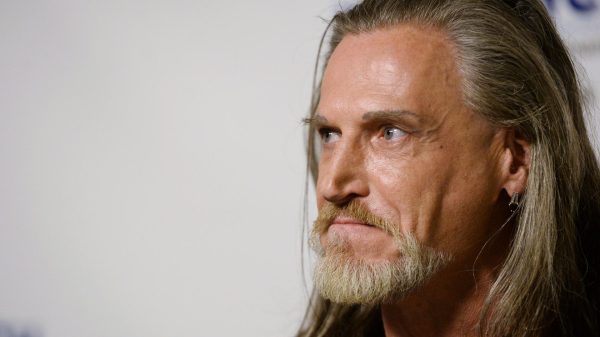 Wolf with the Mercedes Gullwing at the Prince of Monaco Automobile Collection, June 2023 Photo: Eleonora Strano
Wolf with the Mercedes Gullwing at the Prince of Monaco Automobile Collection, June 2023 Photo: Eleonora Strano
This weekend all the main driving forces Formula One has arrived at Silverstone for the British Grand Prix. On the track, seven-time world champion Lewis Hamilton will try to slow down Max Verstappen's seemingly inexorable quest for a third title in a row. On top of that, their respective team principals, Mercedes' Toto Wolff and his nemesis, Red Bull's Christian Horner, will also battle it out: poking fun at the press, competing for talent, positioning their teams for this season and beyond.
But perhaps the most significant power jump made in motorsport this week may have already happened. Its architect was none other than Susie Wolf, Toto's wife. And just quietly, she hopes she may have sparked a revolution.
Wolf, née Stoddart, is a Scottish former racing driver well known in motorsport not for being Toto's soul mate, but for being a former test driver for the Williams team. The 40-year-old has only ridden a few trial and training sessions, yet was as close as any woman in nearly 50 years to actual competition in the sport. Since Lella Lombardi raced in Austria in 1976, no woman has started a Formula One Grand Prix. And only Lombardi and his compatriot Maria Teresa de Filippis have raced in the top category of motorsport since the championship began in 1950.
Wolf hopes to change that. As Managing Director of the F1 Academy, a new women-only single-seater series, she is currently working on what she believes could be a «game-changing deal» with 10 F1 teams that she hopes will will increase the participation of women in motorsport like nothing. before.
Leaning back in his chair in the library of the ultra-exclusive Monaco Yacht Club, looking at the sun's rays reflecting off the luxurious boats rocking in the harbor behind us, Wolf snorted. “That's true,” she nods. “One day he really called me a donkey!” We're talking about her husband, Toto Wolff, one of Formula 1's brightest personalities and the star of the hit Netflix documentary series Formula 1: Ride to Survive.
 Wolf: Don't underestimate the donkey. Photo: Eleonora Strano
Wolf: Don't underestimate the donkey. Photo: Eleonora Strano
The mention of the donkey did come up in an interview the couple did on Ben and Georgie Ainsley's Performance People podcast last year. Discussing their opposite personality types, Susie said that the Vienna-born Toto once compared himself to an Arabian racehorse — «very good, but willful» — whereas she was more of a donkey. «I didn't say you were an ass!» he protested. “There are workhorses in Austria called Haflinger. They are in the mountains… They have such furry legs. They go and go…
In the YouTube version of the podcast, you can see Susie, who by this point is already in hysterics, imitating a man digging a hole even deeper. The exchange is a window into their relationship: playful, loving, with Susie doing her best. But it also says something about their characters. Toto is a great player, there is no doubt about that. Forbes named the Austrian, who owns a third of the Mercedes F1 team, a billionaire on its latest rich list. And Susie? Well, «donkey» might be a bit rude for the woman who once gave Hamilton the chance to make money in karting. But she knows what her husband meant. «Don't underestimate the donkey,» she says, grinning. “It comes to an end. I have a lot of perseverance.» She will need her in her final role.
Over the years, there have been various attempts to encourage the participation of women in motorsports and achieve the ultimate breakthrough: putting a woman back on the Formula One grid. Wolf believes that the Formula 1 Academy is different from others. Firstly, this is the first women's series launched and owned by Formula 1 itself. This means that it is in F1's interest to succeed. So while the W Series, for example, the previous (and highly publicized) all-female series that ran for three seasons before going bankrupt this year, has received an enviable platform from the sport – providing one of F1's coveted «support series» slots. in Grand Prix around the world — the fate of the F1 Academy is much more tied to the brand.
Not only will it compete on the F1 circuit from next season, the two series will work much more closely together. Wolf can't talk about what that might look like yet, as finer details are still being worked out. Suffice it to say that she has some very interesting plans in the near future, which she hopes to announce soon. “I think there are visionary team leaders in Formula 1,” she says. “Of course I feel a real desire inside the paddock to help make a difference now.
Susie Wolff 1
«When I met them all after my announcement [at the opening of the season] in Bahrain, I told them all, 'Please don't think of this as women's stuff.' run by a woman. This is for the greater good of the sport. I hope this will benefit Formula 1 in the long run. And we need to walk this path together.” I must say that so far the response has been very positive.”
Wolf smiles. “But the F1 Academy can't just be 15 young women racing. And we can't have the sole goal of trying to find the next female F1 driver. We must stand for something much more. It's about creating opportunities. How do we make motorsport accessible to girls? That's why I now spend a lot of time in the karting world trying to figure out, okay, who's racing there? At what level? What stops girls from racing? I think this is where we need to be very active. Because this talent pool is what we need to grow.”
Wolf is uniquely positioned to do this. She was born in Oban, in the West Highlands, and grew up in her typical style. Both she and older brother David, who was 18 months older than her, were put on skis and bicycles as children. Her parents, John and Sally Stoddart, owned a motorcycle dealership, and her father was a motorcycle racer, so racing was «in the blood». But, says Wolf, she «was never a typical tomboy.» “I had my Barbie. I had my dolls. I liked it. But I also liked to go fast. I remember going to see my father race at Knockhill. They had a little go-kart track and my brother and I hit on it all weekend. It cost £5 for 10 minutes and we were like, “Can we go again? Can we go again?»
 Driving a Williams F1 during practice for the German Grand Prix at Hockenheim, 2014. Photo: Christopher Lee/Getty
Driving a Williams F1 during practice for the German Grand Prix at Hockenheim, 2014. Photo: Christopher Lee/Getty
The family ended up buying a used kart and that was it, though Wolf insists it was just «for fun» until one day she was taken to a Formula 3 race at Donington Park and saw Jenson Button win. «That's when I thought, 'This is what I want.' After that, I began to participate in the European and World Championships.
It was at this point that Wolf first encountered sexism. She has always been the «only girl» in kart racing. Or at least one of the very few. But as her involvement grew more serious, so did the feeling that she was not just different, but unwanted. “Oddly enough, half of my battle was with the parents of my competitors,” she recalls. “For them, it was not a desire for their sons to be beaten by a girl.”
Sometimes her own teams, supposedly on her side, were just as guilty. When she got into the DTM, the German Touring Car Championship, Wolf was famously forced to drive a pink car. “I hated it,” she says. “It was such a cliché. Nobody wanted this car to overtake him.”
Wolf recalls one particularly embarrassing episode when three-time F1 world champion Niki Lauda came to see his son Matthias. “Mathias and I were teammates and it was a real thrill when Niki came to watch,” she says, wincing. “So, anyway, he walks into the garage where all the drivers were there, and without even saying hello to Matthias, he glanced at me and said to Matthias, “Whatever you do, hit her.” Even Matthias was confused.
«Years later, when we apparently became friends at Mercedes [Lauda was non-executive team chairman], I mentioned it and Niki said, 'Yeah, I know. But I knew it wouldn't help Matthias if you beat him. I said, «But Nicky, I was an impressionable young driver.» Obviously, he belonged to a certain generation. But I think it still exists. This is a brand. Not wanting to be beaten by a girl. The prejudice that women are bad drivers. We have to change that.”
«We're seeing this kind of growth in women's sports that has taken a long time but is really gaining momentum.» 🗣️#F1Academy pic.twitter.com/mebLn928fm
— F1 Academy (@f1academy) June 16, 2023
For the record, Wolf believes there is nothing stopping women from being as fast as men in Formula One. The heavy strain on the neck from the g-forces faced by drivers has been cited as a potential limitation for women, but the F1 uses power steering. Wolf was able to develop the necessary neck strength. Junior categories such as F3 and F2, which are traditionally the gateway to F1, are a big challenge physically as they don't have power steering. Wolff is asking the FIA, motorsport's governing body, to bring these categories into line. “If the pinnacle of the sport is the use of power steering, why do we put obstacles not only to female drivers, but also to smaller and lighter male drivers?” she says.
At other times in Wolff's career, double standards pissed her off. Male drivers could advertise goods or cash in on their fame. But when Wolf did the same, she would be accused of «using her body» to advance her career. This is someone who had and still has a genuine interest in fashion. “It was embarrassing,” she admits. “I gave up a lot of things. I remember being asked about one photo shoot for Vogue Japan. «What? Are you going to give up Vogue? No! It's one of the best games…
Wolf took a couple of cooler shots, but not once did she feel completely comfortable. She praises former US IndyCar driver Danica Patrick, a regular in Sports Illustrated's swimwear editions, for leveraging her competitive edge. “Anyway, I look back and think my USP was my gender and I didn’t play that card enough,” Wolf says. “I think Danika did a great job. She became a household name because she managed to achieve the marketing side as well as performance on the track. She won the Indy race, she fought the Indy500 up front.
Susie Wolf 2
“Ultimately, I think it's all about finding a balance and doing what's comfortable for you. I had one golden rule. I would never date another driver. I wanted to take care of my reputation and just be someone who is considered trustworthy. But I think this idea that you just put on a helmet and race and everything else doesn't matter… it doesn't. Take Lewis. What he brings to the game is his outstanding talent on the go. But also everything that he represents off the track. So, anyway, I look back and say that I should have put more effort into it.”
Does she believe that she was kept? Wolf shakes his head. “I think I have fulfilled my potential. If I now look back with a greater perspective, I was not one of the most talented. I had a lot of perseverance and a lot of determination. Lots of thick skin. So I look back without any bitterness. There were many difficult moments, I will not lie. But I also met Toto, who brought me to where I am now.”
They met in 2009 when Wolf was competing in the DTM. Toto, who was 11 years older than her and had two young children from a previous marriage, co-owned HWA AG, which ran the DTM racing program for Mercedes. A year later, he proposed on a boat in Venice (well, on a boat back to the airport after his original plan to propose in a romantic restaurant was thwarted when a couple they knew sat down at a nearby table) and they married in Capri. . in 2011.
Their relationship, her subsequent role at Williams (of which Toto was a shareholder) and her promotion to senior positions at Venturi Racing, a Monaco-based Formula E team, to the F1 Academy led to allegations of nepotism.
 In a Williams at Silverstone, 2013. Photo: Mark Thompson/Getty
In a Williams at Silverstone, 2013. Photo: Mark Thompson/Getty
“I’m completely fine with that because, after all, I know the truth,” says Wolf. “I got a drive with Williams after I met [team principal] Frank at a DTM event at Brands Hatch and told him that I was doing a school project at Williams at the age of 12. It was true, my mom actually found it the other day — and I've always dreamed of driving an F1 car. At the end of the conversation, he said: «I'll give you 25 laps at Silverstone.» It's like a snowball from there. How much of that was Toto? Impossible to judge. But I feel like I jumped at my chance.
“Toto never told me on the radio how to drive a Formula 1 car. He didn't hold my hand, telling me how to run a Formula E team. I did all this on my own.
I know that I have what it takes to be successful, I don't need Toto to open doors for me.» She pauses. “I think that in some cases having the surname Wolf can be very useful, and in others it is completely useless. But I wouldn't change it for a second.»
It is not so easy to compare their graphs. The couple's main home is in Monaco, but when we meet, Toto is back at the factory in Brackley, Northamptonshire, having just returned from the Canadian Grand Prix. He'll be flying in to take over parenting from Susie — they have a six-year-old son, Jack — when she leaves for Zandvoort at the end of the week. «I don't think we're any different from a lot of couples who have busy jobs,» says Wolf. “I have Toto’s schedule on my phone so I always know what country he is in, or at least when he comes home. And we just have to prioritize. If that means Jack and I jumping on a plane to where it's at to make it work, we'll make it work.»
Wolf admits that it is she who usually compromises. “Someone has to,” she shrugs. “And right now it’s me, for sure. I am based here. And Toto comes in and out. It's a big advantage that I understand the industry so well; why he should be away, why he should stay longer at the plant. All this means is that I won't give him a headache at home when he gets back. I got it.
 With Toto at the presentation of the new Aston Martin DB12 in Cannes in May. Photo: David M. Bennett/Getty
With Toto at the presentation of the new Aston Martin DB12 in Cannes in May. Photo: David M. Bennett/Getty
Have Mercedes' recent problems on the track made things worse? “In fact, I would say that he is now in a better position than a few years ago,” Wolf replies. “I think he had a moment in isolation where he didn’t know if he wanted to stay in the sport. But now he was really biting the bit again. Sometimes I'm in a room when he has a very difficult call and I start to feel, «That's some serious pressure!» But he might just fall over. That is definitely one of his strengths.”
In 2021, the couple moved to Monaco from Switzerland, although they also have a place in Oxford where Toto can commute to the factory. “Trust me, I never thought I would live here,” laughs Wolf. “Obviously I started talking a lot when I joined Venturi. I would leave cold, gray England and land here in blue skies. I just started to think that it’s not so bad here… Now it works for us.”
As you might expect, Jack goes to school with the sons and daughters of other international jetsetters. “His best friend is the son of [BMW driver] Augusto Farfus. Naila Rosberg is a year older, her sister is a year younger,” says Wolf. But in reality, she insists, they don't have a luxurious lifestyle. “My son spends all his school holidays in Scotland because I want him to have that balance. You know it's a bubble. It's not exactly reality. That's why he goes camping with my parents.» As for the Monte Carlo nightlife, Wolf says: “We keep to ourselves. The noisy social life is not my thing at all. You find your tribe, but we spend so much time away that I'd rather stay in the evening than go anywhere.»
The most powerful Formula 1 couple, spending their evenings watching Netflix like the rest of us . ? “I haven’t actually watched Drive to Survive since Abu Dhabi 2021,” Wolf says, referring to the biggest controversy in the modern F1 era, when Hamilton was denied a record-breaking eighth world title due to extreme controversial call from the race director on the last lap of the race. final race.
“I knew what the story would be [last year]. And I just didn't have to watch it. In addition,” she adds, “we are doing our own documentary series about the Formula One Academy. Hello Sunshine, Reese Witherspoon's company, is producing. They have already made a pilot. So move on to Drive to Survive.»
Don't underestimate the donkey. After all, it is.


























































Свежие комментарии